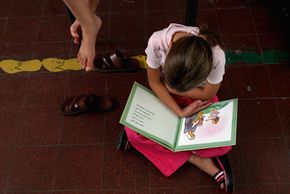
Say "toy boat" three times fast. Did you quickly find that you can't articulate the two words correctly more than once or twice? After that, the words degrade, right? If you can say "toy boat" three times fast correctly, you're in the minority. Try saying it ten times fast. Despite your best effort, the words seem to fall apart in your mouth. "Toy boat" becomes "tie boyte" or some similar perversion of the intended words.
"Toy boat" and other tongue twisters reveal an interesting phenomenon. Tongue twisters are universal -- every language has them, although they differ from language to language. But why do people have this problem?
Advertisement
Science is still working toward a full understanding of the exact cognitive process by which we speak, but what researchers have concluded is that numerous regions of the brain are responsible for the process of speech production. If any one of these functions becomes impaired or doesn't develop properly, your speech can be affected.
When you read the first sentence of this article, you understood a command to say "toy boat" three times in rapid succession. One region of your brain read the words and formulated the command. You then made the decision whether or not to follow the command. If you chose to follow it, another region of your brain understood the written words and began the process of speaking the words you read.
This process is no small matter. Your diaphragm has to produce the proper amount of pressure to form the word. Your vocal cords relax or contract, depending on the words. And then there's your tongue. Signals from your brain tell your tongue what to do based on what you've learned during your cognitive development of speech.
When it comes to articulating speech, the tongue is the tool for accuracy. This organ has a variety of movements in its repertoire, like pressing against the back of your top front teeth when you make a /t/ sound. Notice that your tongue pulls away the moment the /t/ sound has been completed. Try keeping your tongue pressed against the back of your front teeth while you make a /t/ sound. It won't do it. Your tongue is a very precise instrument, and a variety of factors are involved in its movements to influence our speech.
Try talking without moving your tongue. For the most part, you can make your tongue lie dormant when you talk, but the words come out as guttural sounds that barely resemble what you intend to say. Without your tongue, the sounds you make are like roughly cut marble blocks. Your tongue ultimately carves and polishes these sounds into words.But as agile as it is, your tongue has its limitations. Which leads us to the question, is it your tongue or your brain that is actually responsible for our inability to articulate tongue twisters? And exactly why can't you say "toy boat" three times fast, regardless of which is responsible? Find out on the next page.
Advertisement














